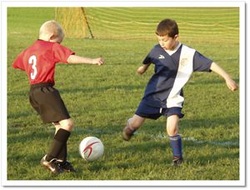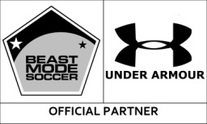The art of coaching youth soccer requires one thing in abundance... enthusiasm. It's your most important quality. Kids will respond to you if you're an eager, hard working leader. Some kids find learning boring, some don't care about winning, and some can't remember which goal they're kicking towards. But what unites them is the desire to have fun and play a game. This is our blueprint for successful soccer coaching.
Think first
Think about why you want to be a soccer coach and what you want to achieve from your soccer coaching drills and training sessions. Gain trust and respect. You are a role model with responsibility to your team. If you set high standards for the drills, the children will follow. Be enthusiastic and make your soccer drills fun.
Praise not criticism
Be patient with your kids, you get more out of them if you praise their efforts and hard work rather than criticise. Body language is important. Smiles and positive gestures will reap rewards. Shouting will not help you keep control and many parents watching may not like it. Be consistent, set achievable goals and give lots of feedback.
Get the knowledge
If you understand the skills and techniques involved in what you are trying to teach, you will be better equipped to pass this on. Try out the soccer drills yourself, are they too hard, too easy? Demonstrating how skills and drills work is better than using words. If you can’t do a particular skill, use one of your helpers who can.
Warm-up drills and warm-down drills are essential!
You must make sure the kids stretch their muscles before and after a soccer (football) training session. Growing bodies need to be looked after. Some knowledge of how the body responds to training and how to prevent injuries is important.
Remember, you’re training individuals
Some kids take longer than others but it doesn’t mean they are not as good, you have to adapt to their speed rather than the other way around. Make sure you have equipment and kit for the whole group. Children react badly to being left out. Avoid soccer drills where some kids have to sit out. Don’t make all the games competitive.
Mind games
You are the confidence-builder for individuals and the team, set goals, control emotions, help your kids concentrate. As a soccer coach you are in charge of minds as well as your players' physical skills.
Think first
Think about why you want to be a soccer coach and what you want to achieve from your soccer coaching drills and training sessions. Gain trust and respect. You are a role model with responsibility to your team. If you set high standards for the drills, the children will follow. Be enthusiastic and make your soccer drills fun.
Praise not criticism
Be patient with your kids, you get more out of them if you praise their efforts and hard work rather than criticise. Body language is important. Smiles and positive gestures will reap rewards. Shouting will not help you keep control and many parents watching may not like it. Be consistent, set achievable goals and give lots of feedback.
Get the knowledge
If you understand the skills and techniques involved in what you are trying to teach, you will be better equipped to pass this on. Try out the soccer drills yourself, are they too hard, too easy? Demonstrating how skills and drills work is better than using words. If you can’t do a particular skill, use one of your helpers who can.
Warm-up drills and warm-down drills are essential!
You must make sure the kids stretch their muscles before and after a soccer (football) training session. Growing bodies need to be looked after. Some knowledge of how the body responds to training and how to prevent injuries is important.
Remember, you’re training individuals
Some kids take longer than others but it doesn’t mean they are not as good, you have to adapt to their speed rather than the other way around. Make sure you have equipment and kit for the whole group. Children react badly to being left out. Avoid soccer drills where some kids have to sit out. Don’t make all the games competitive.
Mind games
You are the confidence-builder for individuals and the team, set goals, control emotions, help your kids concentrate. As a soccer coach you are in charge of minds as well as your players' physical skills.


 RSS Feed
RSS Feed

